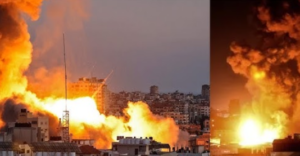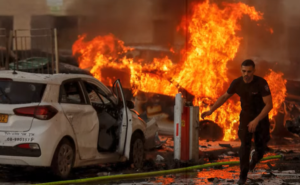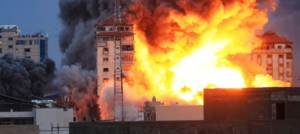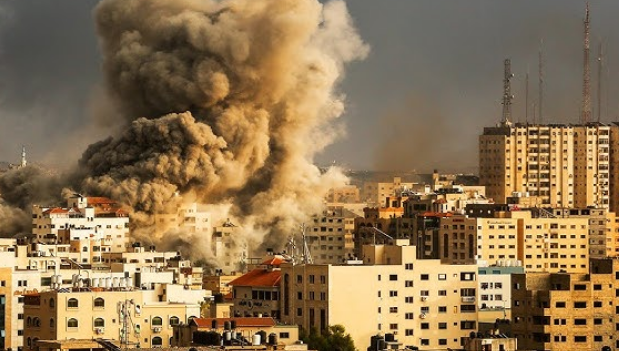Photos: YouTube Screenshots
Once again, Israel and the Palestinians are at war. Hundreds are dead, thousands are wounded, Hamas has killed men, women, and children, and taken more than 100 hostages. Gaza is now under siege.

Hamas claims the attacks in the Gaza Strip are in response to denial of access to the holy site known as the Aqsa Mosque to Palestinians and the Israelis as the Temple Mount. But it’s far more than that: It’s about the Occupation, and Israel’s blockade of Gaza for the last 16 years.
A Palestinian professor in Gaza writes:
“Instead of reacting to one of apartheid Israel’s regular genocidal attacks, the resistance movements have taken the ‘first’ step in an unprecedented move. . . . Enough is enough. The resistance movements in Gaza, right and left, have decided to turn the table upside down. They have given the Palestinian struggle a new impetus, a clear direction towards liberation and decolonization.”
The Palestinian Authority’s leader, Mahmoud Abbas, no friend of Hamas, justifies its attacks by citing Israel’s
“denial of the Palestinian people’s legitimate right to self-determination and the establishment of their independent state with East Jerusalem as its capital, the ongoing Israeli aggression against the Palestinian people, their land, and their sacred sites, and the continued terrorism of Israeli settlers.”
Such defenses of Hamas and the Palestinian cause are undermined, however, by the atrocities that Hamas fighters have committed, and the innocent families and settlements that have been wiped out. It is indiscriminate murder.
The Netanyahu government thus has grounds for declaring a war on terrorism. But he risks going too far, making a disproportionate response.
He vows to destroy Hamas’ grip on Gaza by sealing off the entire territory, denying food, fuel, and electricity to the entire 2.3 million population. His defense minister says he has “released all restraints” on the Israel Defense Forces (IDF); “Gaza will never return to what it was,” the minister says.
It’s Israel’s 9/11, people are saying, but if so, Netanyahu is committing the same error George W. Bush made: using a surprise attack to launch an all-out war with no moral or legal boundaries rather than limit the response to going after the assailants.

A “Suicidal” Attack
The mainstream media is failing as usual to offer some perspective on motivations and consequences. Forgotten are the impoverishment of Gaza, the abandonment of the Palestinian cause by the Arab states, and the latest round of dispossession of Palestinian lands under the far-right Israeli government. Instead, the focus is on the Biden administration’s endorsement of Israel’s “right to defend itself and its people, full stop. There is never a justification for terrorist attacks . . . ”
Yes, but neither is there justification for abandoning the rules of war by condoning collective retribution, such as bombing residential areas. Indiscriminate IDF attacks on civilian targets will almost certainly set the stage for future Palestinian resistance even if Hamas is destroyed.
One observer regards Hamas’ mission as “suicidal”: a willingness to risk its own destruction and, presumably, see Gaza reduced to rubble in order to call attention to Palestinian grievances. If that is the mission, it is more likely to result in the IDF’s occupation of Gaza than its liberation.
Some Questions
I suggest four questions that speak to the ways this war is different from previous Israeli-Palestinian conflicts.
First, Hamas has given the far-right Israeli government a gift of sorts. Netanyahu can now be the wartime prime minister, using the rally-round-the-flag effect to force protesters of his so-called judicial reform, such as army veterans, to come to the aid of their country. His “unity government” brings in a key opposition politician, Benny Gantz, probably postponing a reckoning over the domestic political crisis. But will Netanyahu wind up being one of the war’s victims, blamed for inciting the attacks and failing to prevent them? One astute observer in Israel believes the intelligence failure and Netanyahu’s response to the attacks will prove his undoing.
Second, the hostage situation poses a very difficult challenge for the Israeli government, since it involves military as well as civilian captives. The price tag for their release, if indeed any hostages will be released, will be high indeed. Is the government willing to pay the price? Or will Hamas refuse to negotiate and carry out its threat to execute hostages, in retaliation for Israel’s bombardment of Gaza?
Third, what will become of Biden’s plan to bring about Israel-Saudi Arabia normalization of relations? Destroying that plan may have been one of Hamas’ motives. As an Israeli observer comments, Hamas’ attacks are “intended to show the world that if there is going to be a deal between Israel and Saudi Arabia, the Palestinians need to be included” (Nomi Bar-Yaacov @ChathamHouseISR). Up to now, they have been ignored, as usual.
Finally, the role of Iran is under investigation in Washington and Tel Aviv. As of this writing, US intelligence has reportedly found that Iran was surprised by the Hamas attacks. Should that finding change, or should the US or Israel determine that Iran’s previous aid to Hamas is sufficient justification for taking military action against Tehran, Biden’s support of Israel’s “self-defense” will be tested. Is US support unconditional and open-ended?
Many questions; the answers may have to await the war’s end.
For now, we must condemn the horrific violence both sides are committing. As both engage in the politics of revenge, a tragedy of appalling dimensions unfolds. We listen in vain for calls to deescalate, to seek a cease-fire, to broker the hostage situation.
No kind of normalcy can ever be recovered so long as mutual barbarism prevails.

Mel Gurtov, syndicated by PeaceVoice, is Professor Emeritus of Political Science at Portland State University and blogs at In the Human Interest.

















